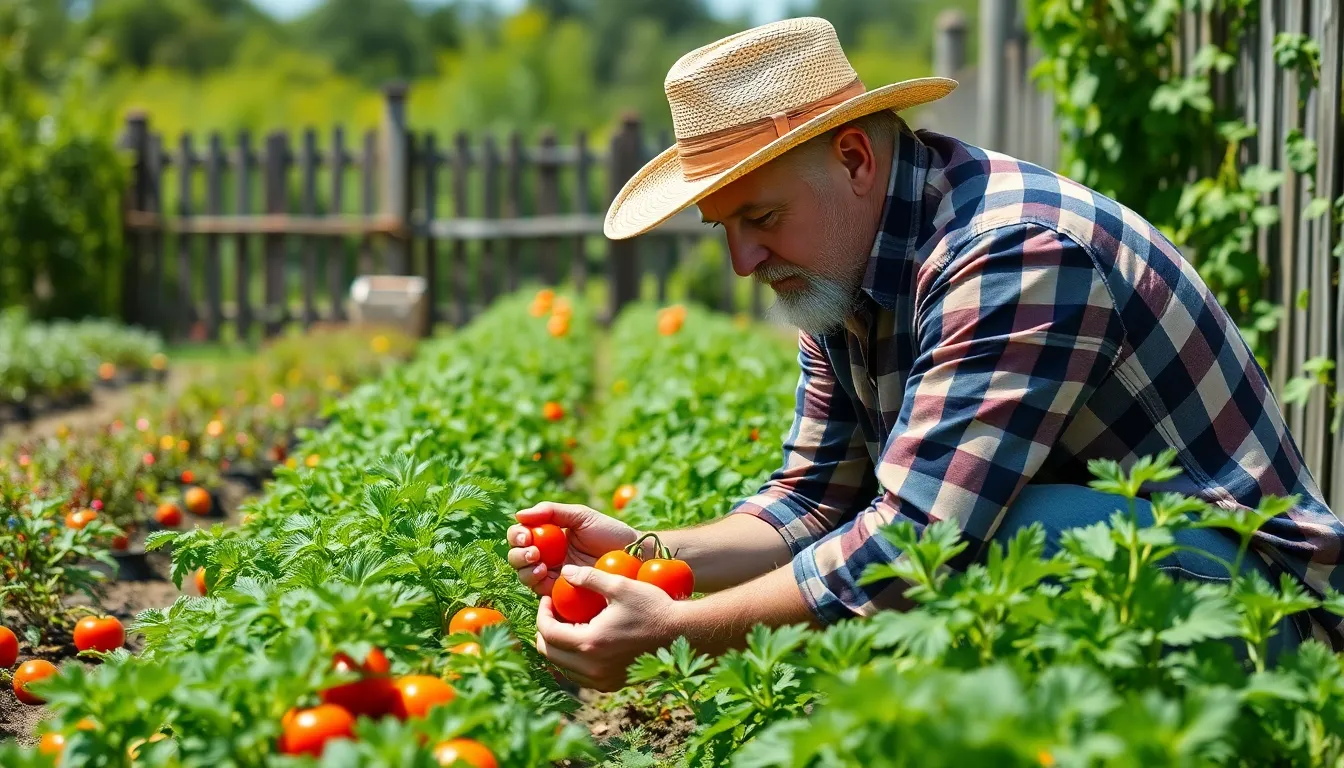In a world increasingly focused on sustainability, small-scale organic farming stands out as a beacon of hope. This approach not only promotes healthier food options but also fosters a deeper connection between farmers and their communities. By prioritizing ecological balance and biodiversity, small-scale organic farmers create a sustainable model that benefits both the environment and local economies.
As consumers become more conscious of their food choices, the demand for organic produce continues to rise. Small-scale organic farms offer fresh, nutrient-rich products while minimizing the use of harmful chemicals. This farming method empowers individuals to take charge of their food sources, encouraging a shift towards more responsible and ethical consumption. Embracing small-scale organic farming can lead to healthier lifestyles and a more resilient planet.
Table of Contents
ToggleOverview of Small-Scale Organic Farming
Small-scale organic farming focuses on cultivating crops and livestock without synthetic fertilizers, pesticides, or genetically modified organisms. This agricultural approach emphasizes nutritious food production while prioritizing environmental health. Small-scale farms, often ranging from one to ten acres, utilize diverse growing methods and contribute significantly to local economies.
Small-scale organic farmers prioritize ecological balance and biodiversity. By employing crop rotation, intercropping, and cover cropping, these farmers enhance soil health and promote pest control naturally. These practices lead to a reduced carbon footprint compared to industrial farming methods.
As consumer demand for organic produce rises, small-scale organic farms provide a vital solution for food insecurity. According to the USDA, organic farming sales reached $62 billion in 2020, reflecting a continuous growth trend. Small-scale farms meet this demand by supplying fresh, nutrient-rich products that support health-conscious consumers.
Community engagement plays a crucial role in small-scale organic farming. Farmers often establish relationships with local markets, restaurants, and consumers, strengthening the local food system. Moreover, small-scale farms promote educational initiatives and workshops, fostering awareness about sustainable practices.
Small-scale organic farming encourages responsible consumption patterns by prioritizing ethical practices. By choosing organic options, consumers contribute to a sustainable food system that protects human health and the environment. This shift towards small-scale, organic methods helps build resilience against climate change and market fluctuations.
Small-scale organic farming serves as a critical component for sustainability and food security, fostering connections within communities and enhancing ecological integrity.
Benefits of Small-Scale Organic Farming

Small-scale organic farming offers numerous advantages, contributing to a healthier environment, economy, and population. This farming approach supports sustainability and promotes well-being across various dimensions.
Environmental Sustainability
Environmental sustainability thrives through small-scale organic farming practices. It enhances biodiversity by incorporating diverse crops that support various species, leading to a balanced ecosystem. Soil health improves due to the use of organic fertilizers and compost, which increase nutrient availability. Reduced reliance on synthetic pesticides encourages natural pest control methods, further protecting local wildlife. Additionally, small-scale farms often minimize their carbon footprint by utilizing localized distribution methods and reducing fossil fuel dependency.
Economic Advantages
Economic advantages manifest distinctly in small-scale organic farming. Farmers typically experience higher profit margins, as organic products fetch premium prices. Local markets benefit from increased economic activity, keeping funds within the community. Employment opportunities also expand due to the labor-intensive nature of organic farming, which often requires more hands-on management than industrial methods. Furthermore, smaller farms foster resilience by diversifying income streams through seasonal crops and value-added products.
Health Benefits
Health benefits play a significant role in the appeal of small-scale organic farming. Organic produce contains fewer pesticide residues and higher nutritional value, addressing growing consumer health concerns. Studies show that organic foods may contain higher levels of antioxidants, vitamins, and minerals. Community-supported agriculture programs foster direct connections between consumers and farmers, highlighting the importance of fresh, local produce. These health benefits contribute not only to individual well-being but also to overall public health improvement.
Challenges in Small-Scale Organic Farming
Small-scale organic farming faces several challenges that can impact sustainability and profitability. These challenges often stem from resource limitations and market access issues.
Resource Limitations
Resource limitations present significant hurdles for small-scale organic farmers. Farmers often face difficulties accessing affordable land, reliable financing, and quality inputs like seeds and organic fertilizers. In many cases, limited financial resources restrict the ability to invest in equipment or adopt new technologies that enhance productivity. Additionally, small farms may struggle with labor shortages, making it challenging to maintain crop health and manage harvesting efficiently. According to the USDA, about 80% of organic farms are family-owned, indicating dependence on family labor, which can limit operational capacity during peak seasons.
Market Access
Market access remains a critical challenge for small-scale organic farmers. Competing against large industrial farms can prove difficult due to differences in pricing and distribution networks. Many local markets prioritize established suppliers, making it challenging for small-scale farmers to secure stable outlets for their products. Additionally, inconsistent product supply and varying consumer demand can hinder farmers’ ability to build reliable customer bases. A survey by the Organic Trade Association reveals that nearly 40% of organic farmers experience difficulties reaching customers directly, necessitating innovative marketing strategies to connect with health-conscious consumers.
Successful Practices in Small-Scale Organic Farming
Successful small-scale organic farming relies on effective practices that enhance sustainability and crop yield. Key practices include crop diversity and soil health management.
Crop Diversity
Implementing crop diversity maximizes resilience in small-scale organic farms. Farmers often cultivate a variety of crops, which reduces the risk of disease and pest outbreaks. This diversity fosters ecological balance and benefits pollinators. For example, intercropping—growing different crops together—can optimize space and promote nutrient usage. Additionally, choosing native species can reduce water usage and enhance adaptability to local climates, benefiting overall farm productivity.
Soil Health Management
Maintaining soil health is vital for successful organic farming. Farmers use techniques such as cover cropping, crop rotation, and organic amendments like compost or manure to improve soil structure and fertility. Cover crops protect soil from erosion and enhance nutrient cycling, while crop rotation breaks pest cycles and prevents nutrient depletion. Regular soil testing helps farmers identify nutrient needs, allowing for targeted interventions that promote healthier crops. Conclusively, robust soil health contributes to increased crop resilience and productivity, affirming its significance in organic farming practices.
Case Studies in Small-Scale Organic Farming
Small-scale organic farming presents a dynamic landscape, with numerous examples illustrating its effectiveness and innovation worldwide. Exploring specific regional examples and innovative solutions showcases the potential of this agricultural model.
Regional Examples
- California: In California, small-scale organic farms dominate the market with diverse crops, including fruits, vegetables, and nuts. These farms often participate in community-supported agriculture (CSA) programs, connecting directly with consumers and enhancing the local food system.
- New York: In New York, farms like Hearty Roots Community Farm implement sustainable practices to produce organic vegetables. They emphasize educational outreach, teaching the community about organic farming and healthy eating, thus building stronger connections among local residents.
- Brazil: Brazilian smallholders utilize agroecological practices, incorporating polycultures and natural pest control. This method improves biodiversity and yields, while also increasing farmers’ resilience against climate variability.
- Kenya: In Kenya, small-scale organic farmers grow varieties of crops using intercropping and agroforestry techniques. They benefit from improved soil fertility and water retention, addressing food insecurity while enhancing local ecosystems.
Innovations and Solutions
- Permaculture Design: Many small-scale organic farms adopt permaculture principles, integrating crops and livestock in ways that mimic natural ecosystems. This innovative approach enhances soil health and reduces the need for external inputs.
- Agroecological Practices: Agroecology emphasizes harmonizing farming with ecological principles. Farmers adopt crop rotations, cover crops, and natural pest management, thus increasing productivity sustainably while protecting biodiversity.
- Mobile Apps: Farmers increasingly use mobile applications for market access, efficiently connecting with consumers and promoting products. Such digital tools streamline sales processes and provide valuable data on market trends.
- Community Cooperatives: Small-scale farmers often join cooperatives to share resources, access larger markets, and negotiate better prices. These collaborations enhance economic viability while fostering community engagement and support.
- Solar-Powered Technology: Farms are adopting solar energy solutions to power irrigation systems and equipment. This transition reduces reliance on fossil fuels, leading to lower operational costs and reduced environmental impact.
Each of these examples and innovations highlights the resilience and adaptability of small-scale organic farming, demonstrating its crucial role in building sustainable food systems.
Small-scale organic farming stands as a vital component in the quest for sustainable food systems. By prioritizing ecological balance and community engagement, it not only enhances environmental health but also addresses pressing issues like food insecurity. This farming model empowers local economies and promotes healthier lifestyles through nutrient-rich produce.
Despite the challenges faced, such as market access and resource limitations, the innovative practices adopted by small-scale farmers showcase resilience and adaptability. The ongoing growth of organic farming reflects a shift towards more responsible consumption patterns. As awareness of its benefits continues to rise, small-scale organic farming is poised to play an increasingly important role in shaping a sustainable future for agriculture and communities alike.




